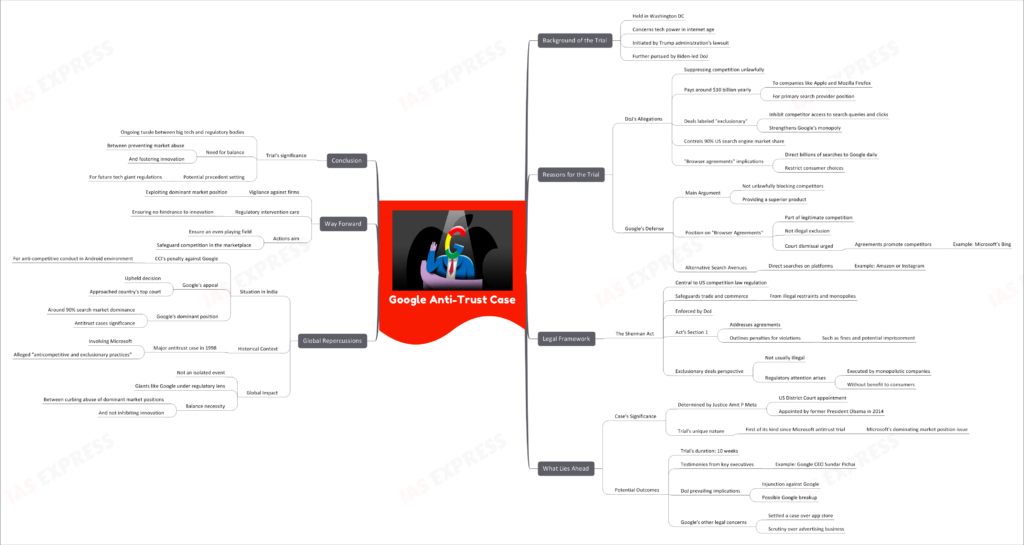Google’s Anti-Trust Case- Everything You Need to Know
From Current Affairs Notes for UPSC » Editorials & In-depths » This topic
IAS EXPRESS Vs UPSC Prelims 2024: 85+ questions reflected
The trial held in Washington DC is considered significant concerning tech power in today’s internet age. Initiated by the Trump administration’s lawsuit against Google, the Biden-led DoJ has further pursued the case, indicating the weight of the issue at hand.

Background of the Trial
Reasons for the Trial
- DoJ’s Allegations:
- Google is accused of unlawfully suppressing competition.
- Google allegedly pays around $10 billion yearly to companies like Apple and Mozilla Firefox to secure its position as the primary search provider on smartphones and web browsers.
- The government alleges these deals to be “exclusionary”, as they inhibit Google’s competitors from accessing search queries and clicks. This move further strengthens Google’s monopoly.
- Google reportedly controls a staggering 90% of the search engine market share in the US. Such “browser agreements” direct billions of searches to Google daily, restricting consumer choices.
Google’s Defense:
- Main Argument: Google has not unlawfully used these agreements to block its competitors but has provided a superior product.
- Position on “Browser Agreements”: Google asserts that these agreements are a facet of legitimate competition and not illegal exclusion. The court was urged to dismiss the DoJ’s case since the agreements with Apple and other companies let them promote competitors, e.g., Microsoft’s Bing.
- Alternative Search Avenues: Google emphasized that individuals now have diverse ways to search online, such as directly searching on platforms like Amazon or Instagram.
Legal Framework
The Sherman Act:
- The Sherman Act of 1890 is central to competition law regulation in the US.
- It aims to safeguard trade and commerce from illegal restraints and monopolies, with enforcement by the DoJ.
- The Act’s Section 1 specifically addresses agreements and outlines penalties for violations, such as hefty fines and potential imprisonment.
- Deals that exclude competitors are not usually illegal and don’t attract regulatory attention unless executed by monopolistic companies without any counterbalancing benefit to consumers.
What Lies Ahead
Case’s Significance:
- The outcome will be determined by Justice Amit P Meta of the US District Court, appointed by former President Obama in 2014.
- This trial is the first of its kind since the government’s antitrust trial against Microsoft a quarter-century ago, where Microsoft was also accused of using its dominating market position to unfairly neutralize its competition.
Potential Outcomes:
- The trial is projected to span 10 weeks with testimonies from key executives like Google CEO Sundar Pichai.
- If the DoJ prevails, an injunction could be issued against Google, possibly leading to its breakup.
- Google has recently settled another case over its app store and is also under scrutiny over its advertising business.
Global Repercussions
Situation in India:
- The Competition Commission of India (CCI) penalized Google for its anti-competitive conduct within the Android environment.
- Google appealed the decision, but it was upheld, leading Google to approach the country’s top court.
- Google’s dominant position in the search market, reaching around 90%, makes such antitrust cases highly significant.
Historical Context:
- The previous major antitrust case was in 1998, involving Microsoft, where similar “anticompetitive and exclusionary practices” were alleged.
Global Impact:
- This isn’t an isolated event. Globally, giants like Google are often under the regulatory lens. Such cases emphasize the need for a balance between curbing abuse of dominant market positions and not inhibiting innovation.
Way Forward
- Regulatory bodies worldwide need to be vigilant against firms exploiting their dominant market position.
- Equally, care is necessary to ensure that such regulatory interventions don’t hinder innovation.
- Actions taken should aim to ensure an even playing field and safeguard competition in the marketplace.
Conclusion
The trial against Google underscores the ongoing tussle between big tech companies and regulatory bodies, emphasizing the need to strike a balance between preventing market abuse and fostering innovation. The outcome of this trial could set a precedent for how tech giants are regulated in the future.
Practice Question for Mains
Discuss the repercussions of the Google anti-trust case. Comment on the situation in India. (250 words)
If you like this post, please share your feedback in the comments section below so that we will upload more posts like this.

